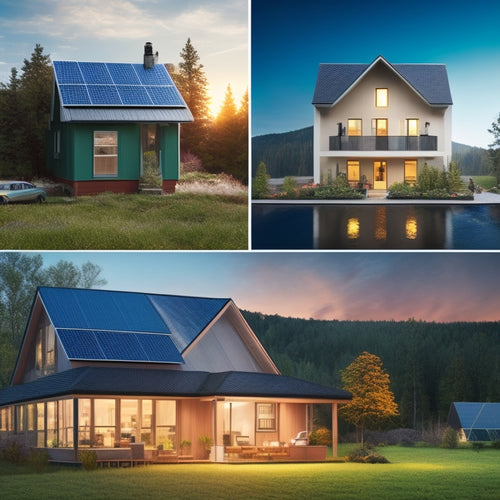
The Arrival of the Electric Car Review: Comprehensive Guide
Share
The electric car has reached a critical tipping point, with rapid advancements in technology, infrastructure, and consumer adoption transforming the automotive industry and paving the way for a sustainable transportation future. Electric vehicles optimize performance, range, and efficiency, with charging infrastructure evolving greatly and battery technology advancing to improve energy density. Market trends show limited vehicle availability, yet increasing adoption rates driven by environmental concerns and decreasing battery costs. As the industry continues to shift, understanding the basics, market insights, and buyer's guides will be essential in steering through the electric car revolution, and the future holds much in store.
Key Takeaways
• Electric vehicles have made significant strides in performance, range, and efficiency, making them a viable alternative to traditional cars.
• Despite limited availability and long waiting times, EV adoption rates are rising due to growing environmental concerns and decreasing battery costs.
• Understanding EV charging options, total ownership costs, and maintenance tips is crucial for a seamless transition to electric vehicles.
• The future of electric cars looks promising, driven by advancements in technology, decreasing production costs, and growing consumer demand.
• Electric vehicles offer a solution to reducing greenhouse gas emissions and mitigating climate change, making them an attractive option for environmentally conscious consumers.
Understanding Electric Car Basics
At the heart of electric vehicles lies a vital set of configurations, each designed to optimize performance, range, and efficiency, with understanding these basics being essential for making informed decisions in the EV market.
Central to this understanding is the role of charging infrastructure, which has evolved greatly in recent years. Fast-charging networks now enable rapid replenishment of battery power, alleviating range anxiety and enhancing overall practicality.
Advances in battery technology have also played an important role, with improvements in energy density and power output contributing to increased driving ranges and enhanced performance.
Market Insights and Trends Today
Today, the electric car market is characterized by limited vehicle availability, long waiting times for orders, and challenges related to range for long-distance trips, despite an increasing presence of electric vehicles in the automotive industry.
Despite these hurdles, EV adoption rates are steadily rising, driven by growing environmental concerns and decreasing battery costs. Governments and companies are investing heavily in expanding charging infrastructure, alleviating range anxiety and paving the way for widespread EV adoption.
As the market continues to evolve, we can expect to see significant growth in EV sales, further driving innovation and investment in this space. As charging infrastructure improves, EVs will become an increasingly viable option for consumers, leading to a potential turning point in the industry's shift to electric.
Real Stories of Electric Conversion
Personal anecdotes from early adopters of electric vehicles provide valuable insights into the experiences, motivations, and challenges faced by individuals who have embraced electric transportation. These personal journeys offer a unique perspective on electric vehicle adoption, highlighting the emotional and practical considerations that drive individuals to make the switch.
From environmentally conscious consumers to tech-savvy enthusiasts, the stories of early adopters reveal the diverse motivations behind electric vehicle adoption. By sharing their experiences, these pioneers of electric transportation provide a relatable and authentic perspective on the benefits and challenges of owning an electric vehicle.
Their stories serve as a catalyst for others, inspiring a new wave of electric vehicle adoption and further expediting the shift to a more sustainable transportation system.
Buyer's Guide to Electric Vehicles
When considering an EV, it is crucial to evaluate EV charging options, including level 1, level 2, and DC fast charging, and their corresponding costs.
A thorough cost analysis should also be conducted to understand the total cost of ownership, including fuel, maintenance, and potential incentives.
In addition, understanding EV maintenance tips can help owners maximize savings and extend the lifespan of their vehicle.
The Future of Electric Cars
As the automotive industry continues to evolve, electric vehicles are poised to play an increasingly dominant role, driven by advancements in technology, decreasing production costs, and growing consumer demand. Future predictions suggest that EVs will become even more mainstream, with many countries investing heavily in EV infrastructure and incentivizing adoption.
The significant environmental impact of this shift is notable, with EVs offering an essential solution to reducing greenhouse gas emissions and mitigating climate change. As battery technology improves, range anxiety will become a thing of the past, and charging times will decrease, making EVs an increasingly viable option for consumers.
With continued innovation, electric vehicles are poised to revolutionize the automotive landscape, paving the way for a sustainable transportation future.
Frequently Asked Questions
How Do Electric Cars Impact the Environment Compared to Traditional Vehicles?
Electric cars greatly reduce the carbon footprint and improve air quality compared to traditional vehicles, emitting zero tailpipe emissions and decreasing greenhouse gas emissions by an estimated 70% over their lifetimes.
Can Electric Cars Be Charged Using Renewable Energy Sources at Home?
Did you know that 80% of electric vehicle owners charge their cars at home? Yes, electric cars can be charged using renewable energy sources at home, such as solar panels, promoting energy independence and reducing carbon footprint.
Are Electric Cars Suitable for People With Limited Parking or Garage Space?
Urban dwellers with limited parking or garage space can find electric cars suitable, thanks to compact designs and space-saving features, making them an ideal option for city living where space is a premium.
How Does the Cost of Electric Car Maintenance Compare to Gas-Powered Cars?
Interestingly, electric vehicles require 30% less maintenance compared to gas-powered cars. When it comes to cost, electric car maintenance is generally lower, with fewer moving parts and no oil changes needed. Battery replacements are typically factored into maintenance schedules, which helps minimize unexpected expenses.
Can Electric Cars Be Used for Long Road Trips or Are They Limited to City Driving?
For long road trips, electric cars can be a viable option, but range anxiety is a concern. However, many EVs now offer extended ranges, and roadside assistance services are available to mitigate concerns, making long-distance travel increasingly feasible.
Related Posts
-

What Does Your Home Energy Audit Report Reveal?
Your home energy audit report reveals a detailed analysis of your energy consumption patterns, highlighting areas of ...
-

What Do Power Strips Do for Standby Energy?
You're likely aware that your devices, such as TVs and computers, continue to draw power even when turned off, a phen...
-

What Water-Saving Gardens Complement Electric Vehicle Ownership?
As you pair your electric vehicle with a water-saving garden, you're not only reducing your carbon footprint but also...


